BBC Trending and
BBC News Ukrainian
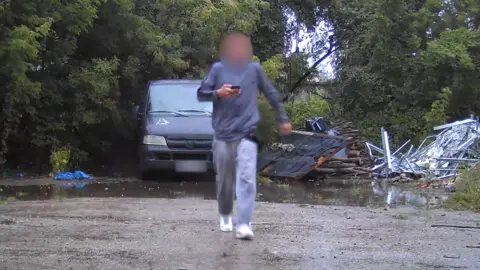 SBU
SBUIn July this year a 17-year-old travelled 500 miles from his home in eastern Ukraine to collect a bomb and a phone hidden in a park in the western city of Rivne.
He says he was promised $2,000 (£1,520) to plant the bomb in a van used by Ukraine’s military conscription service.
“When I was connecting the wires, I thought it could explode then. I thought I might die,” he told the BBC.
Vlad is one of hundreds of children and older teenagers who the Ukrainian government alleges have been recruited online by Russia, and offered payment to carry out sabotage and other attacks against their own country. His name has been changed to protect his anonymity.
He says he was told to set up the phone to live-stream the scene to his handler so they could remotely detonate the device when somebody entered the vehicle.
However, Ukraine’s SBU security service had been watching and foiled the attack. Vlad – now 18 – is awaiting trial on terrorism charges that potentially carry a 12-year prison sentence.
Sitting in Rivne’s heavily guarded detention centre with his lawyer beside him, he acknowledges that he could have helped kill somebody.
“I did think about it. But nobody likes conscription officers,” he says. “I thought: Well, I’ll be like everyone else.”
The SBU says that over the last two years more than 800 Ukrainians have been identified as having been recruited by Russia – 240 of them minors, some as young as 11.
However, cyber security expert Anastasiia Apetyk, who teaches courses about internet safety in Ukraine, is aware of even younger cases. “They tried to recruit children aged nine or 10,” she says.
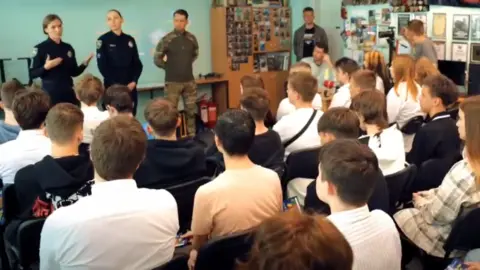 SBU
SBUAndriy Nebytov, Deputy Head of Ukraine’s National Police, says there is a deliberate strategy to seek out the vulnerable who can be manipulated.
“Children do not always fully realise the consequences of their actions,” he says.
“The enemy is not ashamed of using minors for making explosives out of household chemicals, planting them in various locations such as army recruitment offices or police stations.”
The SBU says recruitment primarily takes place on the Telegram app, but also on TikTok, and even on video game platforms. Officials says those who are recruited are almost always motivated by money rather than pro-Russian sympathies.
Vlad says he does not support Russia and had no previous involvement with crime.
He had joined two Telegram channels and posted that he was looking for remote work. Within half an hour, a man calling himself Roman replied. When they later talked on the phone, Vlad says Roman spoke Russian with a street accent.
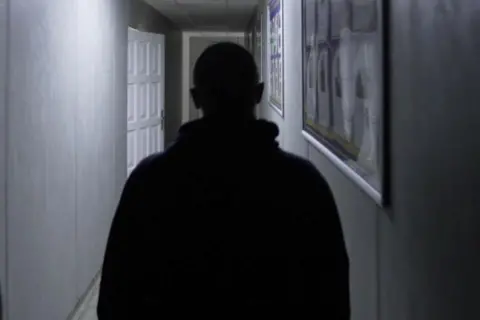 SBU
SBUVlad says he was initially reluctant but was persuaded to take on a series of increasingly dangerous tasks. First, he was told to collect a grenade but when he reached the designated location it wasn’t there. He was paid $30 anyway.
A few days later came another job – to set fire to a van belonging to a conscription centre, film it and run.
For that attack, Vlad says he received about $100 in cryptocurrency – much less than the $1,500 he’d been promised. Roman told him he would get the rest if he planted the bomb in Rivne.
Cash for chaos
The Telegram channels the BBC has seen where recruitment takes place are not explicitly pro-Russian, but they amplify anger felt by some Ukrainians towards the conscription service, which has been dogged by allegations of brutality and corruption.
Using a burner phone and an alias we joined several we were tipped off about.
The channels contained clips of fires and explosions which they claimed were carried out on their orders. But the BBC has not been able to verify the circumstances surrounding those videos.
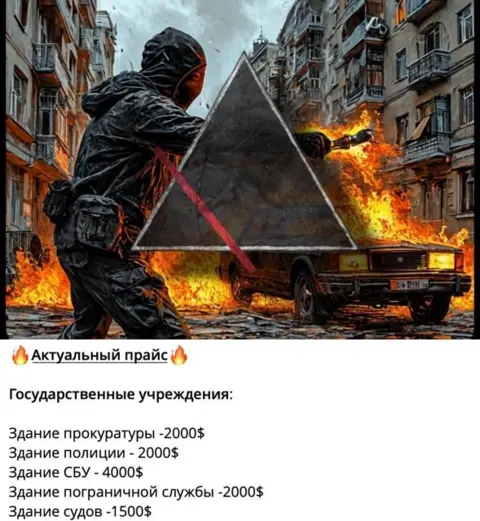 Telegram
TelegramOne account we contacted immediately offered payment, either in cryptocurrency or via bank transfer, to carry out arson. We were told to contact a second account for more details and then received a message with a price list detailing how much they offered to pay for different targets.
The payments ranged from $1,500 for setting fire to a post office to $3,000 for a bank. Banks were worth more, they explained, because security glass made them harder to attack.
“You either need to pour petrol inside or throw a few Molotov cocktails inside,” the account advised.
But even ordinary Ukrainians looking for employment can find themselves offered money to carry out sabotage.
We found adverts offering high pay for unspecified part time work posted in a variety of unrelated Ukrainian Telegram groups, including some geared at refugees and even beauty tips. When we followed one up, a recruiter again offered thousands of dollars for arson attacks and asked us to send videos as proof.
“I need all the arson I can get,” they messaged. “Finding a reliable person is far more difficult than parting with money. That’s why I pay exactly what I say and I do it very quickly, usually within a couple of hours after receiving the video.”
The BBC reported a number of these channels, accounts, chats and bots to Telegram, which removed a few but not most of them. One of the channels that is still active has grown by over 750 subscribers since we started monitoring it, meanwhile an account that we told Telegram had directly offered us payment for an arson attack is still live.
In a statement, Telegram said: “Calls to violence or destruction of property are explicitly forbidden on Telegram and are immediately removed whenever discovered.”
 SBU
SBUUkrainian officials have publicly named members of Russia’s intelligence agencies they suspect of acting as handlers to saboteurs.
The BBC has not been able to independently verify that the Russian state itself is responsible.
However, several European governments have said that they have evidence of Russian agents recruiting young men to carry out acts of vandalism, arson, or even surveillance in their countries. In the UK, six men were jailed for their part in a Russian-ordered arson attack on a London warehouse providing aid to Ukraine.
In Ukraine, hundreds of alleged saboteurs are awaiting trial, but for some the consequences can be deadly. Several suspects have been killed by explosives they were carrying.
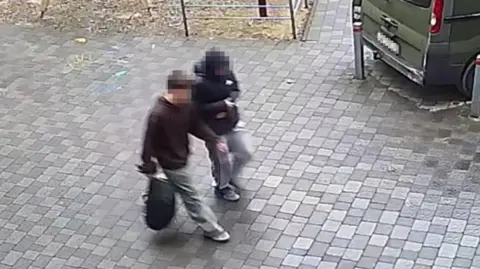 SBU
SBUThe SBU claims Russian handlers have deliberately detonated devices remotely, knowing their agents would be killed.
In March, a 17-year-old died and a 15-year-old was badly injured when a bomb they were believed to be taking to a rail station in Ivano-Frankivsk exploded.
The BBC put the SBU’s allegations to the Russian Embassy in London. In a statement it accused Ukraine of a similar sabotage campaign using Russian citizens.
“The practices that you mention have become a trademark of the Ukrainian special services. In particular: recruitment of civilians, including children, to carry out arson, sabotage or bombings against people, buildings or vehicles.”
There have been reports attributing acts of sabotage inside Russia to Ukrainian recruitment on Telegram. But again, it is notoriously difficult to verify who exactly is behind these attacks.
Meanwhile Vlad has a message for others tempted by the recruiters.
“It’s not worth it. They will either cheat you, and then you will end up in prison just like me, or you can take a bomb in your hands and it will simply blow you up.”
